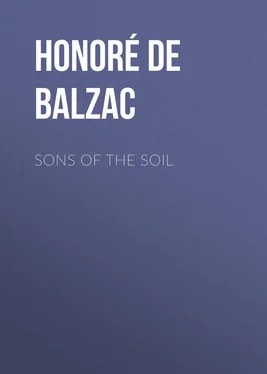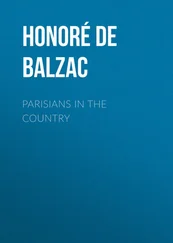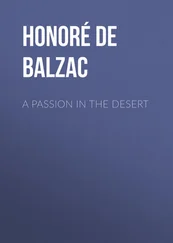Honoré Balzac - Sons of the Soil
Здесь есть возможность читать онлайн «Honoré Balzac - Sons of the Soil» — ознакомительный отрывок электронной книги совершенно бесплатно, а после прочтения отрывка купить полную версию. В некоторых случаях можно слушать аудио, скачать через торрент в формате fb2 и присутствует краткое содержание. Жанр: literature_19, foreign_antique, foreign_prose, на английском языке. Описание произведения, (предисловие) а так же отзывы посетителей доступны на портале библиотеки ЛибКат.
- Название:Sons of the Soil
- Автор:
- Жанр:
- Год:неизвестен
- ISBN:нет данных
- Рейтинг книги:5 / 5. Голосов: 1
-
Избранное:Добавить в избранное
- Отзывы:
-
Ваша оценка:
- 100
- 1
- 2
- 3
- 4
- 5
Sons of the Soil: краткое содержание, описание и аннотация
Предлагаем к чтению аннотацию, описание, краткое содержание или предисловие (зависит от того, что написал сам автор книги «Sons of the Soil»). Если вы не нашли необходимую информацию о книге — напишите в комментариях, мы постараемся отыскать её.
Sons of the Soil — читать онлайн ознакомительный отрывок
Ниже представлен текст книги, разбитый по страницам. Система сохранения места последней прочитанной страницы, позволяет с удобством читать онлайн бесплатно книгу «Sons of the Soil», без необходимости каждый раз заново искать на чём Вы остановились. Поставьте закладку, и сможете в любой момент перейти на страницу, на которой закончили чтение.
Интервал:
Закладка:
“You are in the wrong, Vatel,” said Brunet; “you have no right to enter houses, don’t you see?”
The old woman, a little hump-backed creature, stood on the sill of the door, with her hands on her hips, darting flashes from her eyes and curses from her foaming lips shrill enough to be heard at Blangy.
“Ha! the villain, ‘twas well done! May hell get you! To suspect me of cutting trees! — me , the most honest woman in the village. To hunt me like vermin! I’d like to see you lose your cursed eyes, for then we’d have peace. You are birds of ill-omen, the whole of you; you invent shameful stories to stir up strife between your master and us.”
The keeper allowed the sheriff to bathe his eyes and all the while the latter kept telling him that he was legally wrong.
“The old thief! she has tired us out,” said Vatel at last. “She has been at work in the woods all night.”
As the whole family had taken an active hand in hiding the live wood and putting things straight in the cottage, Tonsard presently appeared at the door with an insolent air. “Vatel, my man, if you ever again dare to force your way into my domain, my gun shall answer you,” he said. “To-day you have had the ashes; the next time you shall have the fire. You don’t know your own business. That’s enough. Now if you feel hot after this affair take some wine, I offer it to you; and you may come in and see that my old mother’s bundle of fagots hadn’t a scrap of live wood in it; it is every bit brushwood.”
“Scoundrel!” said the keeper to the sheriff, in a low voice, more enraged by this speech than by the smart of his eyes.
Just then Charles, the groom, appeared at the gate of the Grand-I-Vert.
“What is the matter, Vatel?” he said.
“Ah!” said the keeper, wiping his eyes, which he had plunged wide open into the rivulet to give them a final cleansing. “I have some debtors in there that I’ll cause to rue the day they saw the light.”
“If you take it that way, Monsieur Vatel,” said Tonsard, coldly, “you will find we don’t want for courage in Burgundy.”
Vatel departed. Not feeling much curiosity to know what the trouble was, Charles went up the steps and looked into the house.
“Come to the chateau, you and your otter, – if you really have one,” he said to Pere Fourchon.
The old man rose hurriedly and followed him.
“Well, where is it, – that otter of yours?” said Charles, smiling doubtfully.
“This way,” said the old fellow, going toward the Thune.
The name is that of a brook formed by the overflow of the mill-race and of certain springs in the park of Les Aigues. It runs by the side of the county road as far as the lakelet of Soulanges, which it crosses, and then falls into the Avonne, after feeding the mills and ponds on the Soulanges estate.
“Here it is; I hid it in the brook, with a stone around its neck.”
As he stooped and rose again the old man missed the coin out of his pocket, where metal was so uncommon that he was likely to notice its presence or its absence immediately.
“Ah, the sharks!” he cried. “If I hunt otters they hunt fathers-in-law! They get out of me all I earn, and tell me it is for my good! If it were not for my poor Mouche, who is the comfort of my old age, I’d drown myself. Children! they are the ruin of their fathers. You haven’t married, have you, Monsieur Charles? Then don’t; never get married, and then you can’t reproach yourself for spreading bad blood. I, who expected to buy my tow with that money, and there it is filched, stolen! That monsieur up at Les Aigues, a fine young fellow, gave me ten francs; ha! well! it’ll put up the price of my otter now.”
Charles distrusted the old man so profoundly that he took his grievances (this time very sincere) for the preliminary of what he called, in servant’s slang, “varnish,” and he made the great mistake of letting his opinion appear in a satirical grin, which the spiteful old fellow detected.
“Come, come! Pere Fourchon, now behave yourself; you are going to see Madame,” said Charles, noticing how the rubies flashed on the nose and cheeks of the old drunkard.
“I know how to attend to business, Charles; and the proof is that if you will get me out of the kitchen the remains of the breakfast and a bottle or two of Spanish wine, I’ll tell you something which will save you from a ‘foul.’”
“Tell me, and Francois shall get Monsieur’s own order to give you a glass of wine,” said the groom.
“Promise?”
“I promise.”
“Well then, I know you meet my granddaughter Catherine under the bridge of the Avonne. Godain is in love with her; he saw you, and he is fool enough to be jealous, – I say fool, for a peasant oughtn’t to have feelings which belong only to rich folks. If you go to the ball of Soulanges at Tivoli and dance with her, you’ll dance higher than you’ll like. Godain is rich and dangerous; he is capable of breaking your arm without your getting a chance to arrest him.”
“That would be too dear; Catherine is a fine girl, but she is not worth all that,” replied Charles. “Why should Godain be so angry? others are not.”
“He loves her enough to marry her.”
“If he does, he’ll beat her,” said Charles.
“I don’t know about that,” said the old man. “She takes after her mother, against whom Tonsard never raised a finger, – he’s too afraid she’ll be off, hot foot. A woman who knows how to hold her own is mighty useful. Besides, if it came to fisticuffs with Catherine, Godain, though he’s pretty strong, wouldn’t give the last blow.”
“Well, thank you, Pere Fourchon; here’s forty sous to drink my health in case I can’t get you the sherry.”
Pere Fourchon turned his head aside as he pocketed the money lest Charles should see the expression of amusement and sarcasm which he was unable to repress.
“Catherine,” he resumed, “is a proud minx; she likes sherry. You had better tell her to go and get it at Les Aigues.”
Charles looked at Pere Fourchon with naive admiration, not suspecting the eager interest the general’s enemies took in slipping one more spy into the chateau.
“The general ought to feel happy now,” continued Fourchon; “the peasants are all quiet. What does he say? Is he satisfied with Sibilet?”
“It is only Monsieur Michaud who finds fault with Sibilet. They say he’ll get him sent away.”
“Professional jealousy!” exclaimed Fourchon. “I’ll bet you would like to get rid of Francois and take his place.”
“Hang it! he has twelve hundred francs wages,” said Charles; “but they can’t send him off, – he knows the general’s secrets.”
“Just as Madame Michaud knows the countess’s,” remarked Fourchon, watching the other carefully. “Look here, my boy, do you know whether Monsieur and Madame have separate rooms?”
“Of course; if they didn’t, Monsieur wouldn’t be so fond of Madame.”
“Is that all you know?” said Fourchon.
As they were now before the kitchen windows nothing more was said.
CHAPTER V. ENEMIES FACE TO FACE
While breakfast was in progress at the chateau, Francois, the head footman, whispered to Blondet, but loud enough for the general to overhear him, —
“Monsieur, Pere Fourchon’s boy is here; he says they have caught the otter, and wants to know if you would like it, or whether they shall take it to the sub-prefect at Ville-aux-Fayes.”
Emile Blondet, though himself a past-master of hoaxing, could not keep his cheeks from blushing like those of a virgin who hears an indecorous story of which she knows the meaning.
“Ha! ha! so you have hunted the otter this morning with Pere Fourchon?” cried the general, with a roar of laughter.
Читать дальшеИнтервал:
Закладка:
Похожие книги на «Sons of the Soil»
Представляем Вашему вниманию похожие книги на «Sons of the Soil» списком для выбора. Мы отобрали схожую по названию и смыслу литературу в надежде предоставить читателям больше вариантов отыскать новые, интересные, ещё непрочитанные произведения.
Обсуждение, отзывы о книге «Sons of the Soil» и просто собственные мнения читателей. Оставьте ваши комментарии, напишите, что Вы думаете о произведении, его смысле или главных героях. Укажите что конкретно понравилось, а что нет, и почему Вы так считаете.












